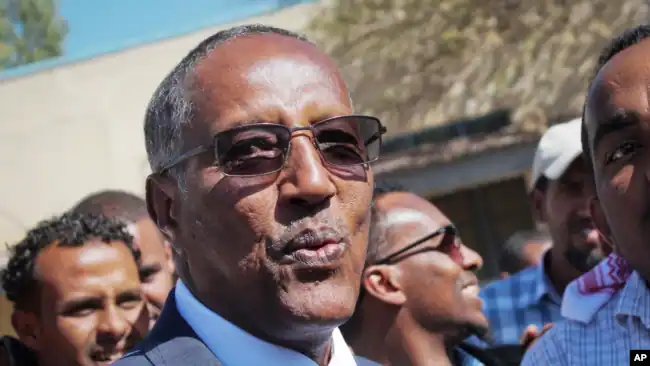Somaliland’s president is leaving the United States without the legal recognition he sought for his self-declared republic. Nonetheless, he considers his vacation a success.
In an interview with VOA’s Somali Service on Saturday, Muse Bihi Abdi said, “The most important issue to us that we talk with people is recognition” as an independent sovereign entity apart from Somalia.
He arrived on March 13 for a series of meetings with US government officials, UN staff, think tanks, and civil society groups in the hopes of gaining support. Later this week, he intends to return to Somaliland.
While the Biden administration reaffirmed its commitment to a unified Somalia, it also hinted at the prospect of closer ties with Somaliland.
After Bihi met with State Department Assistant Secretary Molly Phee on March 14, the Bureau of African Affairs tweeted, “Welcomed the chance to meet… and explore enhancing U.S. engagement with Somaliland within the framework of our shared Somalia policy.”
Last week, Risch and two other members of the committee – Republican Mike Rounds and Democrat Chris Van Hollen – introduced a bill that would require the State Department to report to Congress on its engagement with Somaliland and authorize a study on the feasibility of establishing a direct US-Somaliland partnership.
Bihi has urged the US to establish a diplomatic presence in Somaliland’s capital, Hargeisa, which he was greeted during a bipartisan congressional reception on Thursday.
Somaliland portrays itself as a relatively quiet and stable partner in the volatile Horn of Africa region, where Somalia has been fighting al-Shabab militants for more than a decade and Ethiopia has been mired in civil conflict since November 2020.
The Heritage Foundation noted in introducing Bihi’s keynote address last week at the conservative think tank’s Washington offices that the breakaway state is strategically located on the Gulf of Aden, near Djibouti, which is home to the only permanent US military base in Africa and China’s first overseas base.
The talks have stalled.
In 1991, Somaliland declared independence from Somalia, which regards it as a northern breakaway territory rather than an independent country. The two sides have held multiple rounds of talks, the most recent of which took place in Djibouti in June 2020, when they agreed to form technical committees to continue discussions. Since then, no meetings have taken held.
Bihi attributes the impasse to the Mogadishu government’s refusal to deal with Somaliland.
“Despite nine rounds of talks,” he stated at the Heritage Foundation, “the status of Somaliland never materialized.”
Bihi went on to say that Somaliland has “no future in continuing that dialogue with Somalia” and is “prepared to seek all possible routes for international recognition.” “Somaliland thinks that the world community owes it to Somaliland to support its efforts to gain international recognition.”
In an interview with VOA, he said that the US “stood where other governments and Europe stand, which is ‘this problem is for Africa to decide.'”
No country, including the African Union, has recognized Somaliland as a sovereign and independent republic.
VOA’s requests for comment on Somaliland were not answered by the presidential palace, the ministry of international affairs, or the information minister in Somalia.
However, Somali President Mohamed Abdullahi Mohamed voiced hope for a united country on June 26, three decades after Somaliland earned independence from Britain.
“I pray to Allah to grant us our dream, which is the restoration of our oneness,” Mohamed, also known as Farmaajo, added. “The people of the North and the South are in desperate need of each other. Let us return to each other and ignore trivial concerns.”
Taiwanese relations
Bihi contrasted Somaliland’s situation to that of Taiwan, an East Asian self-governing island that China has seen as part of its territory since the Communist takeover in 1949.
“Taiwan and the United States have a common goal. We are two countries that are not recognized by the international community “Bihi remarked.
According to Somaliland’s leader, the Taiwanese “are economically developed and educationally successful We must learn from their mistakes and how they dealt with them.”
In July 2020, Somaliland and Taiwan established diplomatic relations. “We’re thousands of miles apart but share a deep-seated love of freedom and democracy,” Taiwan’s foreign ministry declared at the time of the agreement to build friendly relations.
The decision was opposed by Somalia and China, which has veto power in the United Nations Security Council.
Bihi, on the other hand, stated that the Somaliland-Taiwanese relationship was not intended to cause friction with any other country.
He stated that China had “no reason to be angry.” “As a sovereign country, we have the freedom to build connections with anybody we wish.”
Bihi remarked of Somaliland, “We are willing to develop excellent relations with China.” “China needs us, and we need them; we’d like to have good ties with them; we have no ill will toward them, and we hope they have the same attitude toward us.”

